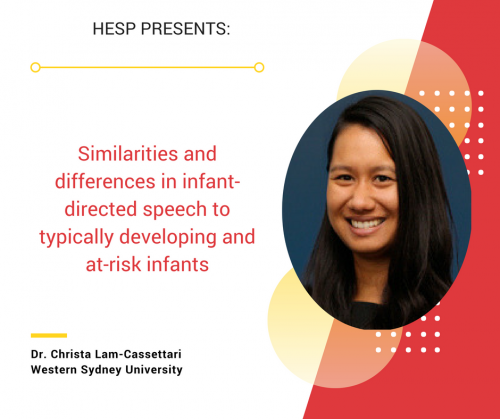Event Date and Time
-
Location
H.J. Patterson 2124
Please join HESP for a talk by:
Dr. Christa Lam-Cassettari
The MARCS Institute for Brain, Behaviour and Development
Western Sydney University
Title: Similarities and differences in infant-directed speech to typically developing and at-risk infants
Abstract: Infant-directed speech is a powerful form of communication that attracts and maintains infant attention, conveys affect and is argued to promote language acquisition. Recent research highlights the importance of the quantity of infant-directed speech in supporting infant vocabulary development. This talk will explore similarities and differences in the quantity and quality of infant-directed speech to typically developing infants, and infants at-risk for developmental delay (e.g., infants with hearing loss and infants with postnatally depressed mothers). The role of infant feedback in shaping mothers’ speech modifications will also be discussed.
Bio: Dr. Christa Lam-Cassettari's current research aims to understand how psychosocial factors influence early speech and language development. The role of infant responsiveness in shaping infant-directed speech modifications to infants is demonstrated in her doctoral dissertation, The Influence of Infant Hearing Loss on Mother-Infant Interaction: Implications for Infant-Directed Speech, Infant Responsiveness and Vocabulary Development. She completed a postdoctoral position at the Nottingham Biomedical Research Unit in Hearing (UK) where she worked on a video-intervention project to enhance parent-child communication in in the context of congenital hearing loss. She also attained Phase 2 accreditation in the delivery of video feedback intervention (VIGUK). Dr. Lam-Cassettari's is currently co-investigator on grants investigating the relationship between vocal emotion in parents' infant-directed speech and child vocabulary development in Sweden and Australia. Her work also examines the impact of post-natal depression on communication with pre-linguistic infants.



